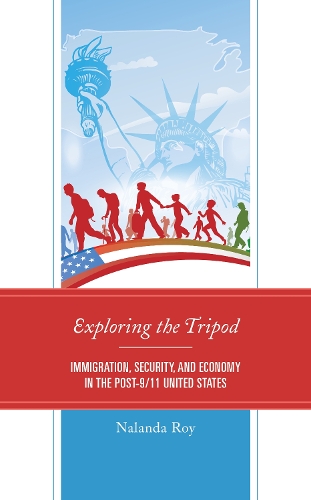
Exploring the Tripod: Immigration, Security, and Economy in the Post-9/11 United States
(Hardback)
Publishing Details
Exploring the Tripod: Immigration, Security, and Economy in the Post-9/11 United States
By (Author) Nalanda Roy
Bloomsbury Publishing PLC
Lexington Books
26th June 2020
United States
Classifications
Professional and Scholarly
Non Fiction
Warfare and defence
Terrorism, armed struggle
Central / national / federal government policies
Migration, immigration and emigration
325.73
Physical Properties
Hardback
136
Width 160mm, Height 229mm, Spine 17mm
386g
Description
Exploring the Tripod: Immigration, Security, and Economy in the Post-9/11 United States is an exploration of the changing relationship between immigration and security in the post-9/11 United States. While extensive research has been done about the effect of 9/11 in the US, whether the effect is related mostly to the socio-economic situation or not is largely ignored. The current problems facing the US are the new policies that deter future immigration, and in turn, affect the US economy. This study forces on the major changes taking place in the U.S. both in terms of national security, as well as economic downturn following 9/11 as well as the current Trump administration. When it comes to immigration before 9/11, security was not the overarching concern in the United States. The focus was on economic interest, skilled and unskilled labor, and family reunification. However, immediately after 9/11, security became indisputably prioritized. September 11 changed the way Americans started to look at security. Immigration continues to make significant contributions to the US economy, whether in terms of manual labor from Mexico and Central America or in terms of more skilled labor mainly from Asia. September 11, led to a thickening of the balance between economic needs and security needs in the United States. This research examines the swinging security-economic growth of the pendulum concerning integration policy.
Reviews
Migration and terrorism have become a central part of the U.S. policy-making agenda, but less obvious is the extent to which terrorism post-9/11 has become both a subject and tool of U.S. immigration policy linked to its national security. In this excellent and well-researched book, Nalanda Roy sheds light on the interconnectivity between immigration, security, and the economy since 9/11 and how each element impacts U.S. national interests. Her book is a must-read for scholars as well as policy-makers in this field, who will find it a remarkable study offering important and novel insights. -- Georgina Chami, University of the West Indies
Author Bio
Nalanda Roy is associate professor of international studies and Asian politics at Georgia Southern University.
